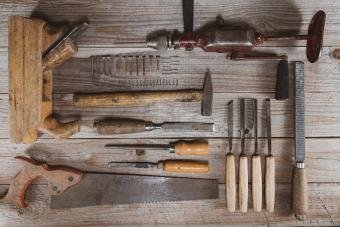
Sports collectibles make up a multi-billion industry and cover a huge range of items, from clothing and equipment to cards, autographs, and posters. Most sports memorabilia collectors pick a particular sport, team, or individual athlete; a particular kind of sports collectible such as cards, baseballs, or photographs; or a particular event, such as the Olympics.
Sports Trading Cards
Trading cards, the most popular sports item collectibled, were first packaged with tobacco products as early as the 1860s, but soon the manufacturers realized they'd do even better packaging them with chewing gum. Early cards usually had the photograph of the player or team on one side and advertisements on the reverse, but as cards became an industry in and of themselves, the back side came to feature information about the player.
Rookie cards (cards from a player's first season) usually become particularly valuable after the player becomes famous, more so than cards from after they become sports celebrities.
Insert cards are limited edition cards that are added to regular packs of cards. The odds of finding an insert card in a pack are printed on the pack. Many of these insert cards have holograms or lenticular printing (plastic that shows a moving figure when tilted). Sometimes insert cards also include threads from a jersey or some other item. They're also known as chase cards because collectors pursue these so enthusiastically.
Olympics Collectibles
Olympics pins, coins, and stamps are by far the most common Olympics collectibles, but collectors with bigger budgets can purchase medals and Olympics torches. Other items include:
- Mascots
- Posters
- Tickets
- Programs
- Souvenirs
Most of these items can be found at specialty sites online like Ingrid O'Neil. You will rarely find Olympic memorabilia at a local antique store.
Sports Jerseys
Sports jerseys are fairly recent sports collectibles, dating from the early 1980s when teams started selling jerseys. The most collectible of these are autographed jerseys or jerseys that a famous player actually wore. One that soccer star Pele wore during a World Cup match fetched almost $250,000 at Christie's auction house, more than triple the estimate.
Autographs and Autographed Items
Autographs, by their very personal nature, can turn a very ordinary item, like a baseball or football, into a collectible. Because many sports collectors request autographs in person, they also become a reminder of the opportunity to meet a player. Many players autograph items at sports collectibles shows, such as Tristar.
Collectors can also request autographs from players after games or by writing. If you write to a player to ask for an autograph, be sure to include return postage and to personalize the letter. Many athletes are used to dealers or others looking for autographs to resell, and so they are more likely to respond to requests from collectors.
Authentication
According to estimates from authorities, dealers, and collectors, anywhere between 30 percent and 90 percent of sports collectibles are at least partly counterfeit. This is one of the highest rates among all collectibles, even more than antiques.The FBI describes this in more detail on the cybercrimes division of their website.
Autographs are the most frequently forged sports collectibles, as adding an autograph to an item can increase its value by thousands of dollars. Some forgers even find authentic blank paper from the past and forge sports signatures on that. Sometimes even an honest but unsophisticated seller, such as a collector, can mistake a machine-signed item for hand-signed. The ease of scanning and printing items has increased the trade in fake sports trading cards, as well.
eBay has identified prominent sports collectibles authentication companies, although even these cannot provide absolute certainty.
Purchasing Sports Collectibles
The monetary value of a sports collectible depends primarily on the fame of the player, the rarity of the item, and its condition. Sports shows and specialty shops are the most common places to purchase sports collectibles. Auction houses are another common source. Heritage Auctions often has sports memorabilia auctions and other auction houses sometimes carry higher-end items.
Remember that ultimately you should always purchase items that you love no matter what you collect.







